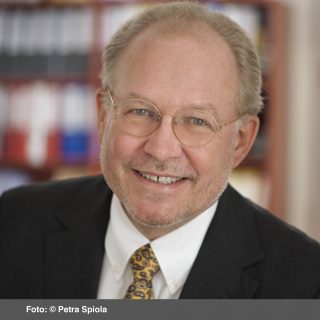 The University of Arkansas, the University Libraries, and the Arkansas State Chapter of the Fulbright Association will celebrate the 70th anniversary of the Fulbright Program with a lecture titled “Philosophy, Politics, Money, and Memory: The Fulbright Program at Seventy, 1946-2016” by Lonnie R. Johnson, Executive Director of Fulbright Austria at 4:30 pm on Wednesday, November 2, in the Helen Robson Walton Reading Room of Mullins Library.
The University of Arkansas, the University Libraries, and the Arkansas State Chapter of the Fulbright Association will celebrate the 70th anniversary of the Fulbright Program with a lecture titled “Philosophy, Politics, Money, and Memory: The Fulbright Program at Seventy, 1946-2016” by Lonnie R. Johnson, Executive Director of Fulbright Austria at 4:30 pm on Wednesday, November 2, in the Helen Robson Walton Reading Room of Mullins Library.
On August 1, 1946, President Harry Truman signed Senator J. William Fulbright’s legislation into law, dedicated to mutual understanding between the people of the United States and other countries. The Fulbright Program has since become the best known and largest academic exchange program in the world, awarding approximately 8,000 grants annually. Roughly 1,600 U.S. students, 4,000 foreign students, 1,200 U.S. scholars, and 900 visiting scholars receive awards, in addition to several hundred teachers and professionals. In the 70 years since the its inception, the program has involved more than 370,000 Fulbright recipients from 165 countries, and among those recipients are 54 Nobel Laureates and 33 heads of state.
On its website, the Department of State praises the Fulbright Program as “the flagship international educational exchange program sponsored by the U.S. government.” Given the established reputation of the program, there is a propensity to take it for granted or to assume that its development has been unproblematic or even-keeled. However, the influences and ideas behind the initial conception of the program, the serendipity that accompanied its initial development, and the political and financial turbulences that have impacted on development and management since its consolidation under the auspices of the Fulbright-Hays Act in 1961 are underexposed. This talk will take a look at the ups-and-downs in the history of Fulbright Program over seven decades: how it initially was institutionalized and has survived episodes of political conflict, institutional gerrymandering, and budget struggles to date.
Lonnie R. Johnson, a native of Minnesota and graduate of St. John’s University, studied abroad in Vienna as an undergraduate and then studied philosophy and history at the University of Vienna. He has more than thirty-five years of administrative experience in international education. Based in Vienna, he has worked with the Institute of European Studies, the Institute for Human Sciences, a center for advanced study, and the Austrian Exchange Service. He has been the executive director of the Fulbright Commission in Austria since 1997, a binational organization that has been responsible for managing the Fulbright exchanges for students and scholars between Austria and the United States since 1950. He has served as the Chairman of the twenty-five member Conference of Fulbright Program Executive Directors in Europe twice and was instrumental in initiating the grassroots www.SaveFulbright.org platform in March 2014 that was established to protest a proposed $30 million budget cut in the Fulbright Program that subsequently was restored by Congress. He has published books and articles on Viennese, Austrian, and Central European history, with the third revised edition of his Central Europe: Enemies, Neighbors, Friends appearing at Oxford University Press in 2010. His recent research has focused on the institutional history of the Fulbright Program.
